
British breeders will find it more difficult to breed their mares to semen from Europe as of 30 April 2024 despite a last-minute import solution, which was not fully adopted.
Border Control Posts
As brexit is the gift that keeps on giving, Britain had to introduce Border Control Posts (BCP) for animals and "germinal products," which includes embryos and chilled semen.
Horse and Hound posted that, "most germinal product consignments are semen, and come in from Europe to East Midlands Airport, where the busiest BCP will be. At the height of the breeding season, this could be 40 or more packages a day, all of which will have to be checked because they fall into the high-risk category of imported products."
Chilled semen will have to go through that bottleneck and breeders fear that delays in the BCP will be detrimental to the viability of the semen and embryos
According to H&H it is unclear "why equine semen is classified as high risk as all consignments are checked by an official vet before departure and certified as being from the right stallion, who has been health-tested and in quarantine for 30 days. The semen is then checked again in this country by the inseminating vet."
Import Solution
On 28th March 2024, the Animal Diseases Policy Group (ADPG) agreed a one-off, temporary contingency measure which reduces the official identity import check rate at a Border Control Post from 100% to 20%; as part of the official import controls for chilled equine germinal products.
This temporary contingency is for a four-month period (May to August 2024 inclusive). This coincides with the peak breeding and import season and will allow this time sensitive trade to continue whilst either enhanced Border Control Post (BCP) and logistics processes are put in place, or a full derogation.
Defra is working with Port Health Authority officials to implement the 20% rate over the initial weeks of operation to minimise disruption to trade.
Temporary Relief
Lorna Wilson of Elite Stallions U.K., who imports semen of more than 500 stallions based across Europe, is relieved.
"After exhaustive talks with all parties, just last week the UK Animal Disease Policy Group agreed an adaptation to the previously approved contingency measures of reduced identity and physical checks at the border," said Lorna.
She continued, "the new scheme does not require any identity or physical checks to be undertaken at the Border Control Post, instead it will involve a pilot scheme whereby some selected vets are invited to participate in a trial of the identity checks being undertaken at destination and the results conveyed to the BCP."
British Breeding posted that "on 18th April 2024, ADPG agreed a temporary adaptation to the ADPG approved temporary contingency measure. This is an optional facilitation, available to the Port Health Authority, for the operational delivery of the official import identity checks by an identity check and declaration from the BEVA (British Equine Veterinary Association) AI (Artificial Insemination) certified veterinarians at destination; working to implement a 20% check rate over the contingency period as part of a pilot scheme."